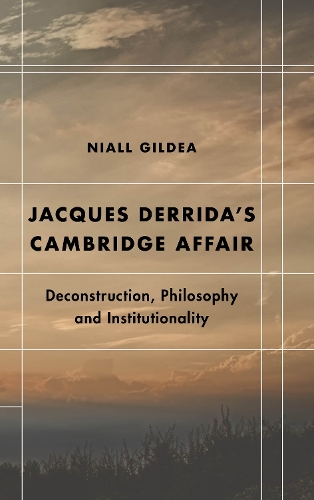
Jacques Derridas Cambridge Affair: Deconstruction, Philosophy and Institutionality
(Hardback)
Publishing Details
Jacques Derridas Cambridge Affair: Deconstruction, Philosophy and Institutionality
By (Author) Niall Gildea
Bloomsbury Publishing PLC
Rowman & Littlefield International
20th November 2019
United Kingdom
Classifications
Professional and Scholarly
Non Fiction
B
Physical Properties
Hardback
228
Width 158mm, Height 234mm, Spine 24mm
531g
Description
What is philosophy A question often asked, but usually in an abstract or speculative way. Rarely do we find a case of 'philosophy' being determined in the real world. However, at Cambridge in 1992, this is exactly what happened, as a debate took place over the merits, or otherwise, of awarding an Honorary Doctorate of Letters to the philosopher Jacques Derrida. Derrida's supporters argued that his deconstruction of Western traditions of thinking ushered in an important new manner of doing philosophy; his detractors dismissed his work as charlatanism, philistinism and non-philosophy. As arguments raged over the validity of introducing the canon of Continental philosophy to the Humanities in British Higher Education the so-called 'Theory Wars' Derrida's 'Cambridge Affair' focalized this decisive conflict more than anything else. This is the first study of the Cambridge Affair. Drawing upon archival and unpublished material, little-known texts pertaining to the Affair, and Derrida's own oeuvre, this original account offers an historical and philosophical reconstruction of this crucial debate, evaluating it against the body of work it put on trial.
Reviews
The so-called Cambridge affair surrounding the work of Jacques Derrida was both a tempest in a teapot and a significant event. Despite its "teapot" provenance, the Cambridge affair needs to be understood if one is to understand Derrida's biographical and philosophical development, the "theory wars" of the 1980s and 1990s, and the gulf separating Anglo-American philosophy and Continental philosophy. Gildea (critical theory, Goldsmiths College and Queen Mary, Univ. of London, UK) provides the material and analysis needed to truly come to terms with this often-referenced (yet poorly understood) event. A great merit of the book is the archival detail it presents. Although the press covered the issue, the perspectives of those actually involved lie in the archives at the University of Cambridge and the University of California, Irvine. One substantial chapter examines the in-house argument among Cambridge faculty articulated via fly sheets. Gildea follows this welcome factual presentation with substantial analysis of the relevant issues in Derrida's work--e.g., the definitions and roles of philosophy and the university. In the book's concluding section, Gildea deals with thinkers (e.g., Martin Hgglund, J. Hillis Miller, Ernesto Laclau) who have elaborated on these issues. Gildea has produced a definitive treatment of a defining moment in Derrida's intellectual career. Summing Up: Highly recommended. Upper-division undergraduates through faculty.
Author Bio
Niall Gildea teaches Critical Theory at Goldsmiths College and Queen Mary, University of London, UK.
